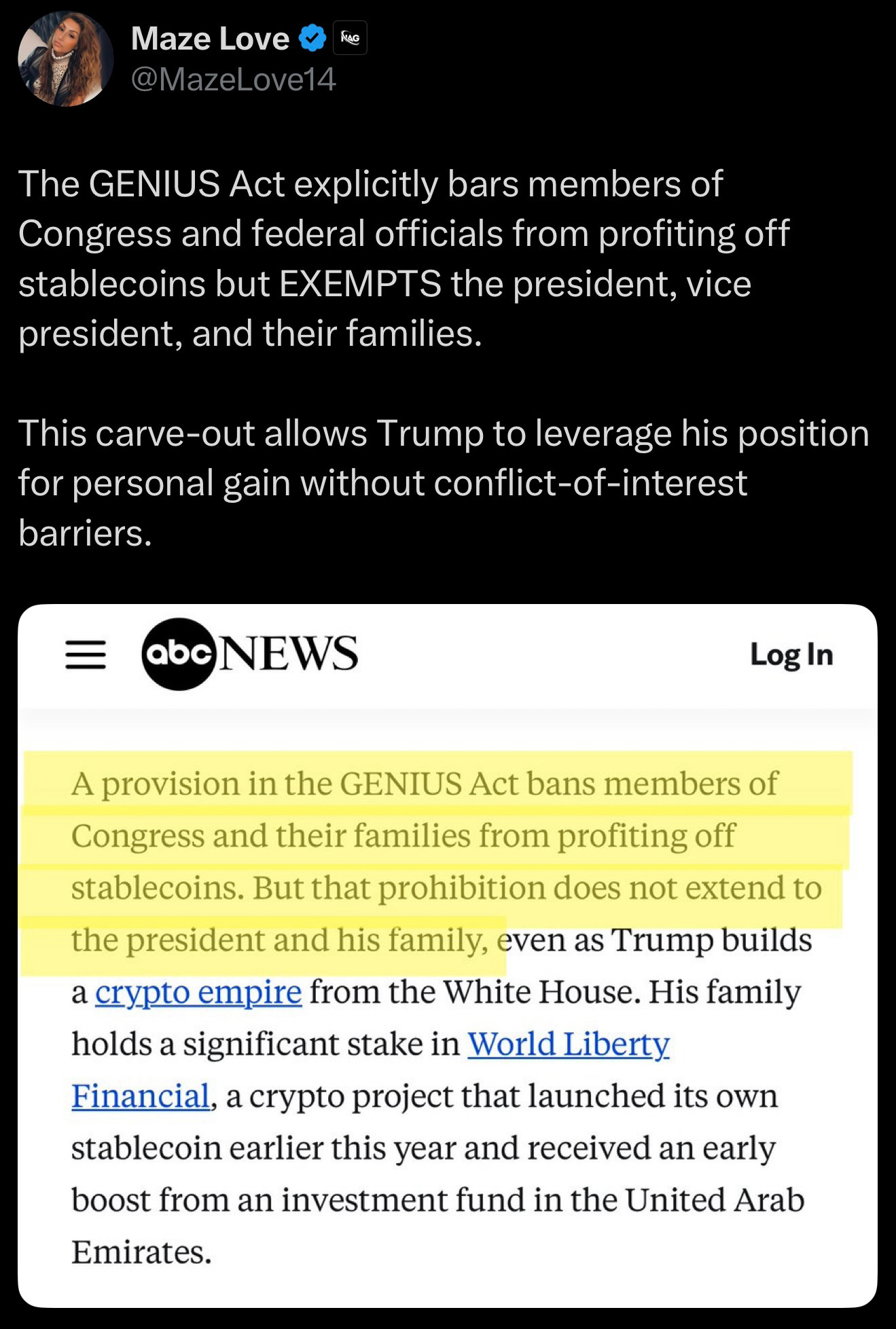Heather Cox Richardson sums up recent chaos in the Trump administration and recognizes that its business as usual. Most egregious is the deference paid to Trump by the reactionary majority on the Supreme Court and the frightened Republicans in Congress. The members of Congress are afraid that Trump will endorse their opponent in the next Republican primary. The Justices have lifetime tenure; they have no excuse for rubber-stamping unconstitutional actions.
Richardson writes:
Without any explanation, the right-wing majority on the Supreme Court yesterday granted a stay on a lower court’s order that the Trump administration could not gut the Department of Education while the issue is in the courts. The majority thus throws the weight of the Supreme Court behind the ability of the Trump administration to get rid of departments established by Congress—a power the Supreme Court denied when President Richard M. Nixon tried it in 1973.
This is a major expansion of presidential power, permitting the president to disregard laws Congress has passed, despite the Constitution’s clear assignment of lawmaking power to Congress alone.
President Donald J. Trump has vowed to eliminate the Department of Education because he claims it pushes “woke” ideology on America’s schoolchildren and that its employees “hate our children.” Running for office, he promised to “return” education to the states. In fact, the Education Department has never set curriculum; it disburses funds for high-poverty schools and educating students with disabilities. It’s also in charge of prohibiting discrimination on the basis of race and sex in schools that get federal funding.
Trump’s secretary of education, professional wrestling promoter Linda McMahon, supports Trump’s plan to dismantle the department. In March the department announced it would lay off 1,378 employees—about half the department. Nineteen states and the District of Columbia sued to stop the layoffs, and Massachusetts federal judge Myong Joun ordered the department to reinstate the fired workers. The Supreme Court has now put that order on hold, permitting the layoffs to go forward.
Justices Ketanji Brown Jackson and Elena Kagan concurred in a dissent written by Justice Sonia Sotomayor, noting that Trump has claimed power to destroy the congressionally established department “by executive fiat” and chastising the right-wing majority for enabling him. “When the Executive publicly announces its intent to break the law, and then executes on that promise, it is the Judiciary’s duty to check that lawlessness, not expedite it,” they say.
“The President must take care that the laws are faithfully executed, not set out to dismantle them. That basic rule undergirds our Constitution’s separation of powers. Yet today, the majority rewards clear defiance of that core principle with emergency relief.”
Another Trump power grab is before Congress today as the Senate considers what are called “rescissions.” These are a request from the White House for Congress to approve $9.4 billion in cuts it has made in spending that Congress approved. By law, the president cannot decide not to spend money Congress has appropriated, although officials in the Trump administration did so as soon as they took office. Passing this rescission package would put Congress’s stamp of approval on those cuts, even though they change what Congress originally agreed to.
Those cuts include ending federal support for the Corporation for Public Broadcasting, which helps to fund National Public Radio (NPR), the Public Broadcasting Service (PBS), and local stations. The Trump administration says NPR and PBS “fuel…partisanship and left-wing propaganda.”
Congress must approve the request by Friday, or the monies will be spent as the laws originally established. The House has already passed the package, but senators are unhappy that the White House has not actually specified what will be cut. Senators will be talking to the director of the Office of Management and Budget, Russell Vought—a key architect of Project 2025—today in a closed-door session in hopes of getting more information.
In June, Vought told CNN that this package is just “the first of many rescissions bills” and that if Congress won’t pass them, the administration will hold back funds under what’s called “impoundment,” although Congress explicitly outlawed that process in the 1974 Impoundment Control Act.
“We still are lacking the level of detail that is needed to make the right decisions,” Senator Susan Collins (R-ME), the chair of the Senate Appropriations Committee, said. “It’s extremely unusual for any senator to not be able to get that kind of detailed information.”
Andrew Goudsward of Reuters reported yesterday that nearly two thirds of the lawyers in the unit of the Department of Justice whose job was to defend Trump administration policies have quit. “Many of these people came to work at Federal Programs to defend aspects of our constitutional system,” one lawyer who left the unit told Goudsward. “How could they participate in the project of tearing it down?”
As the Supreme Court strengthens the office of the presidency without explaining the constitutional basis for its decisions, who is actually running the government is a very real question.
A week ago, Jason Zengerle of the New York Times suggested that the real power in the Oval Office is deputy White House chief of staff Stephen Miller, who is driving the administration’s focus on attacking immigrants. Secretary of Homeland Security Kristi Noem defers to Miller, a Trump advisor told Zengerle. Attorney General Pam Bondi is focused on appearing on the Fox News Channel and so has essentially given Miller control over the Department of Justice. White House chief of staff Susie Wiles is “producing a reality TV show every day” and doesn’t care about policy.
On the same day Zengerle was writing about domestic policy decisions, Tom Nichols of The Atlantic was making a similar observation about international policy. He notes that Trump has only a fleeting interest in foreign policy, abandoning issues he thinks are losing ones for others to handle. Secretary of Defense Pete Hegseth keeps talking about “lethality” and trans people but doesn’t seem to know policy at all. Secretary of State Marco Rubio—who is also the national security advisor—appears to have little power in the White House.
Apparently, Nichols writes, American defense policy is in the hands of Elbridge Colby, the undersecretary of defense for policy, who made the decision to withhold weapons from Ukraine and who ordered a review of the U.S. defense pact with the United Kingdom and Australia in an attempt to put pressure on Australia to spend more on defense.
“In this administration,” Nichols writes, “the principals are either incompetent or detached from most of the policy making, and so decisions are being made at lower levels without much guidance from above.” This is a common system in authoritarian regimes, Nichols notes, “where the top levels of government tackle the one or two big things the leader wants done and everything else tumbles down to other functionaries, who can then drive certain issues according to their own preferences (which seems to be what Colby is doing), or who will do just enough to stay under the boss’s radar and out of trouble (which seems to be what most other Trump appointees are doing). In such a system, no one is really in charge except Trump—which means that on most days, and regarding many issues, no one is in charge.”
Either that chaos or deliberate evil is behind the Trump administration’s recent order to burn nearly 500 metric tons of emergency high-nutrition biscuits that could feed about 1.5 million children for a week. As Hana Kiros reported in The Atlantic, the U.S. Agency for International Development (USAID) spent about $800,000 on the food during the Biden administration for distribution to children in Afghanistan and Pakistan. It was in storage in the United Arab Emirates when the Trump administration gutted USAID. Still, Secretary of State Marco Rubio assured the House Appropriations Committee that the food would get to the children before it spoiled.
But the order to burn the biscuits had already been sent out because, the State Department said, providing food to Afghanistan might benefit terrorists (there was no stated reason for destroying food destined for Pakistan, or suggestion that the food could go to another country). Now the food has passed its safe use date and cannot even be repurposed as animal feed. Destroying it will cost the U.S. taxpayers $130,000.
What the administration does appear to be focused on is regaining control of the political narrative that has slipped away from it. Today, after news broke that inflation is creeping back up as Trump’s tariffs take effect, Trump posted on social media alleging that Senator Adam Schiff (D-CA), who managed one of the impeachment cases against Trump, had committed mortgage fraud and must be brought to justice.
But so far, nothing appears to be working to distract MAGA from the Epstein files. As David Gilbert of Wired noted today, MAGA supporters were angry over a number of things already. Former Fox News Channel host Tucker Carlson hated the bombing of Iran; others hated Trump’s accepting a luxury plane from Qatar. Podcaster Ben Shapiro objected to Trump’s tariffs, and podcaster Joe Rogan has turned against Trump over the targeting of migrants who have not been even accused of crimes. Billionaire Elon Musk turned against Trump over the debt incurred under the new budget reconciliation law Trump called the One Big, Beautiful Bill.
The Epstein files appear to be one bridge too many for MAGA to cross. The administration tried to stop discussion of Epstein, and for a while the effort seemed to catch: by noon yesterday, the Fox News Channel had mentioned Epstein zero times but had mentioned former president Joe Biden 46 times. Today all but one Republican House member voted against a Democratic measure to require the release of the Epstein files. But Chicago journalist Marc Jacob noticed this afternoon that while the Fox News website didn’t mention Epstein in its top 100 stories today, “[t]he top 3 stories on the New York Times website, the top 2 stories on the Washington Post site and the top story on the CNN site are about Jeffrey Epstein.”
And then, this afternoon, Dhruv Mehrotra of Wired noted that the video from a camera near Epstein’s prison cell that the Department of Justice released as “raw” footage had approximately 2 minutes and 53 seconds cut out of it.
Journalist Garrett M. Graff, a former editor of Politico, commented: “Okay, I am not generally a conspiracist, but c’mon DOJ, you are making it really hard to believe that you’re releasing the real full evidence on Epstein….”





